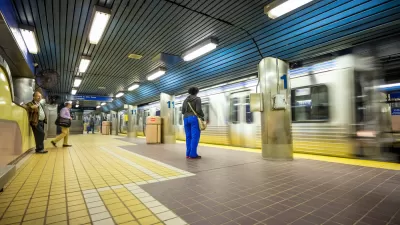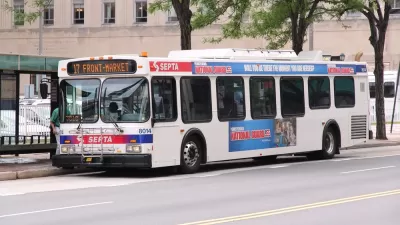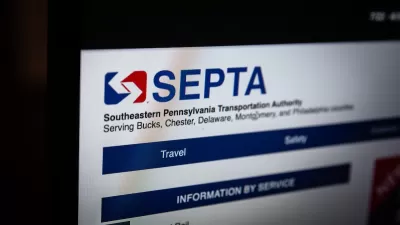Philadelphia planners hope to achieve benefits to traffic safety and transit performance by restricting automobile use of lanes along Roosevelt Boulevard.

Philadelphia is launching a new BAT (business access and transit) lane scheme for a bus route along Roosevelt Boulevard, reports Darryl C. Murphy.
BAT, which stands for business access and transit, is a new-to-Philly breed of lane that prioritizes buses, and lets cars flow into only to make right turns at intersections or businesses. Never before tried on a major road in Philadelphia, the city is now advancing a plan to test BAT lanes on the Boulevard, the most dangerous road in the city and one of the deadliest in the region.
The pilot BAT lane is intended to both speed up bus service along the street but also improve safety. The project is funded by the city's "Routes for Change" project.
As noted by Murphy, the BAT lane idea is a watered down version of bus priority projects implemented recently in New York City and approved recently by San Francisco.
FULL STORY: Philly to test a bus-forward traffic hack on deadly Roosevelt Boulevard

Trump Administration Could Effectively End Housing Voucher Program
Federal officials are eyeing major cuts to the Section 8 program that helps millions of low-income households pay rent.

Planetizen Federal Action Tracker
A weekly monitor of how Trump’s orders and actions are impacting planners and planning in America.

Ken Jennings Launches Transit Web Series
The Jeopardy champ wants you to ride public transit.

California Invests Additional $5M in Electric School Buses
The state wants to electrify all of its school bus fleets by 2035.

Austin Launches $2M Homelessness Prevention Fund
A new grant program from the city’s Homeless Strategy Office will fund rental assistance and supportive services.

Alabama School Forestry Initiative Brings Trees to Schoolyards
Trees can improve physical and mental health for students and commnity members.
Urban Design for Planners 1: Software Tools
This six-course series explores essential urban design concepts using open source software and equips planners with the tools they need to participate fully in the urban design process.
Planning for Universal Design
Learn the tools for implementing Universal Design in planning regulations.
Ada County Highway District
Clanton & Associates, Inc.
Jessamine County Fiscal Court
Institute for Housing and Urban Development Studies (IHS)
City of Grandview
Harvard GSD Executive Education
Toledo-Lucas County Plan Commissions
Salt Lake City
NYU Wagner Graduate School of Public Service





























